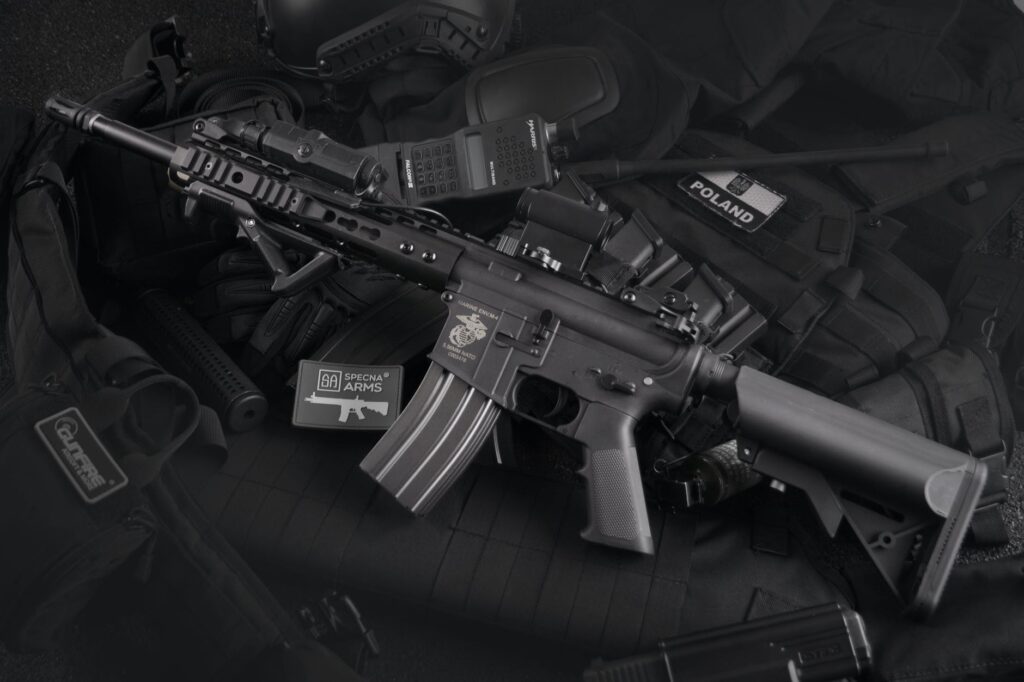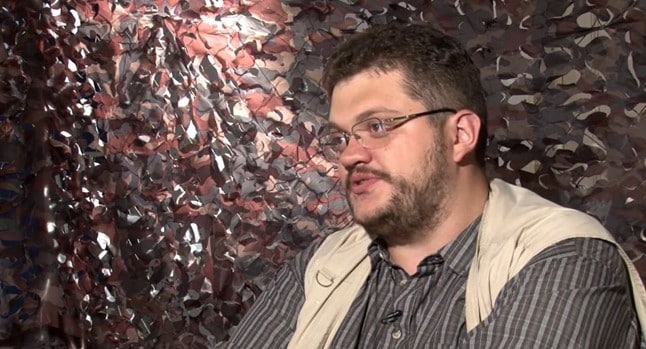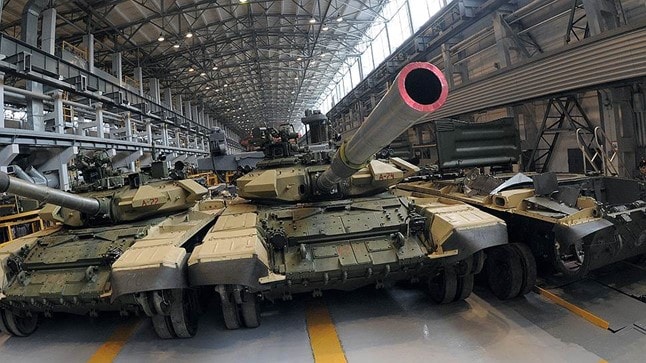
Introduction and English translation of May 30th RBC article via Memri.
As Russia has tightened its hold over information channels to the point of virtually criminalizing criticism of the “special operation” in Ukraine, Russia’s business dailies sometimes succeed in providing unwelcome information to the authorities. Perhaps the authorities do not fear the select readership of these dailies, perhaps it assumes that the readership has access to sources of information. In any case RBC media has provided an article proving that the sanctions imposed on Russia are taking their toll on Russia’s defense industry. It turns out that even the quintessentially Russian Kalashnikov has foreign components. The absence of foreign components has caused extensive production delays, reliance on obsolete equipment, disruption of maintenance schedules and even layoffs.
The RBC report follows below:[1]
“Following the launch of Russia’s military special operation in Ukraine, the US and the European countries imposed a series of new sanctions against the Russian military industrial complex. Now defense industry complex plants are still assessing the risks, but it is already apparent that due to the new restrictions a number of contracts will be postponed. There are problems with the lack of marine diesel engines, import substitution of helicopter and aircraft engines, electronics, replacement of imported components installed in tank’s fire control systems, as well as aircraft repairs. Yet, defense industries claim that the state defense order will be fulfilled at the same level, as in the previous year.
“The industry doesn’t have the task of achieving a 100% level of import substitution for all products, as “Rostec” [corporation] and the Ministry of Industry and Trade emphasize. Reliance is being shifted to parallel imports. RBC has been taking with leading defense industry enterprises and experts to find out from them, how extensive are the problems caused by the new sanctions and what are the plans for resolving them.
“How Did The Authorities In Charge Of The Military-Industrial Complex React
“In early March, Deputy Prime Minister for the Defense Industry, Yury Borisov stated that ‘the full magnitude and depth of the current sanctions… was difficult to forecast.’ However, Borisov noted that in 2021 the state defense order was fulfilled by 98% and that ‘every opportunity for maintaining such indicators in the future’ exists.”

Yuri Borisov (Source: Rg.ru)
“At Rostec they explained to RBC that the corporation’s revenues are comprised of three elements: civilian goods, state defense orders and exports According to the corporation, the latter two accounted for about 55% of corporate revenues, while civilian products accounted for over 45%. ‘Naturally changes (considering today’s reality) are inevitable, the ratio will change. How exactly it will happen? We are now scrutinizing this issue. Approximately by the middle of the year the picture will become clear,’ stated Rostec. ‘Now the companies belonging to the state corporation adjust their plans on a number of projects, in consideration of the new inputs. Their deadlines have been objectively “shifted to the right” (that is, they were postponed to a later date),’ said the Rostec representative, without specifying what these projects are.
“Among the measures being taken, Rostec cited the following: development of new cooperation opportunities, fundamental changes in the suppliers, as well as intensification of import substitution programs in critical areas. For instance, regarding aviation, these concerns: propulsion systems (both for aircraft and helicopters), onboard systems and specialized software for production. Nevertheless, the task of producing absolutely everything [domestically] didn’t and doesn’t exist, the state corporation emphasized. “This is unreasonable, as there are alternative suppliers, there is also a mechanism of parallel import,” they summed up at Rostec.
“The Ministry of Industry and Trade also told RBC that no country in the world is able to completely abandon the use of foreign technologies and components. ‘Statements about 100% import substitution are populist ones,’ argued the ministry. Regarding the decisions to support of the industry, the ministry recalled that during the COVID-19 pandemic the department generated the necessary measures, some of which were perceived as redundant at the time. Thus some measures, brought to a state of readiness, weren’t implemented. ‘And now we are applying these “drafts”,” summarized the ministry, without specifying what tools they were referring to.
“What’s Going On In The Aircraft Industry
“A representative of the United Aircraft Corporation (UAC) stated in an interview to RBC that after the new sanctions were imposed ‘there is more work to be done.’ In the civilian segment [of the industry], the short term maintenance of the serviceability of the existing fleet of Sukhoi Superjet 100 aircraft is an important area of work for Russian manufacturers of planes, systems and components. The work is being performed with the airline companies and each [aircraft] operator has its own “road map” of joint actions. According to UAC, for the past period spare parts depots have been established including a pool of replacement engines. However, ‘there are of course sensitive positions’ regarding the Superjet 100 repairs, admitted the company.
“In early April, Yury Lapin, General Director of IrAero airlines, warned that due to the US and EU sanctions, airlines operating domestically-produced “Sukhoi Superjet 100” aircraft are unable to provide repairs and maintenance to assure the technical fitness of Russian-French SaM146 engines. Such a situation, according to Lapin, may lead to ‘a stoppage of [maintenance] on the fleet of Superjets in the short term perspective. Engine service problems were also reported by managers of three other airlines that fly Superjet planes. One of them noted that his airline will have to stop passenger flights on these planes as early as the fall of 2022, provided the engine tech support won’t improve.
“‘There are the two largest programs in civil aviation: manufacturing and exploitation of the short-haul Superjet 100 and of the medium-haul MS-21.’ Both programs presumed the utilization of a significant number of foreign-produced components, reminded Oleg Panteleev, Executive Director at the AviaPort industry agency. We are talking in particular about American-produced Pratt & Whitney engines for the MS-21 and Russian-French SaM146 engines for the Superjet 100 planes’, he specified. ‘The Americans stopped the supplies, in turn, the French side has also blocked the delivery of its component, i.e., of the generator module and other components. Therefore, it’s not possible to maintain production at the planned speed,’ elaborated the expert.
“‘Regarding combat aircraft, even if somewhere isolated foreign-produced components are being used, they belong to the category where their usage is allowed, because large warehouse inventories of them were created in advance, and they can be bought in the countries that don’t support sanctions’, noted Panteleev.
“At the end of March, the newspaper Kommersant reported that UAC had failed to receive the majority of the MS-21 engines from the American “Pratt & Whitney” company, due to which the commissioning and supply plan for this aircraft had to be reduced. Rostec plans to start deliveries of the MS-21 equipped with a home-produced PD-14 engine in 2024, but even these terms are considered way too optimistic in the industry, stressed the newspaper.
“Deputy Prime Minister, Borisov stated in mid-March that the Russian authorities at the background of sanctions were considering the prospects of increasing the serial production of IL-96 and Tu-214 passenger planes, which are currently produced in small batches for special customers. The UAC told RBC that they are already increasing the manufacturing of Tu-214 planes. ‘These planes will make it possible to support the air transport industry through a difficult period, stated the company.
“As for the helicopter-manufacturing programs, it’s necessary to replace imported engines for Ansat, Ka-62 and Ka-226 helicopters, Panteleev continues. ‘At the same time, there are more concerns about future maintenance and repair of Western-produced machines involved in the production of aircrafts. It’s necessary to purchase them in order to increase the production volume,’ concluded the expert.
“According to the Disclose investigative journalism portal, between 2014 and 2018, the French Thales group of companies equipped 60 twin-seat Su-30 multi-purpose fighters with the latest TACAN navigation systems. What’s more, similar TACAN systems were delivered to Russia for upgrading MiG-29 fighters, as well as special high-tech pilot helmets.
“Since 2014, Russian Air Force jets have been equipped with Sigma 95N navigation systems developed by the French Safran” company, which allow autonomous navigation without satellite signals. According to the Disclose website the target detection systems were supposed to be installed on Ka-52 helicopters.
“What Shipbuilders Say
Commenting on RBC’s question regarding the components, which are in short supply due to new restrictions, the United Shipbuilding Corporation (USC) stated that the volume of domestic production must be increased, first for all for marine diesel engines, for components of propulsion systems, for anchor-mooring equipment and ship systems (water circulation, waste water management, etc.).
“Russian shipbuilders today are going through enormous difficulties regarding the supply of engines for ships of all types: from boats to large warships, Ilya Kramnik Researcher at the Center for North American Studies of IMEMO Russian Academy of Sciences, and Navy expert, confirmed to RBC.
“For instance, multipurpose corvettes of ‘Project 20380′ equipped with guided missiles were initially fitted with engines made by the Kolomna plant. According to Kramnik, the practice of their usage demonstrated that the domestic diesels didn’t meet expectations. As the expert explained, there were complaints about engines’ reliability, power, and upgrade potential. It was decided to equip the improved corvettes of this type (project 20385) with German engines. However, due to the new restrictions the deal was derailed. Thus the fleet continues to use domestically-produced diesel engines, while for some projects the purchase is made in China, noted the expert.
“There are relatively few companies in the world that are capable of producing powerful modern diesel ship engines. And Russian companies aren’t among them, although Russia possess some competence in manufacturing diesel, stressed Kramnik. Regarding the propulsion systems and anchor-mooring equipment, traditionally the emphasis was put on imported components, and it remains unclear how promptly domestic developments can be introduced, summed up the expert.”

Ilya Kramnik (Source: Newprospect.ru)
“The USC has developed and is implementing import substitution plans for these types of equipment, as stipulated by the Shipbuilding Industry Development Strategy drawn up to 2035. It is planned to start serial production of cycloidal propellers for a series of river-sea vessels, in addition to domestic engines, whose [production] has been already mastered, and which are supplied en masse to such vessels. Besides, the Russian enterprises, which deal with engine production are upgrading them to the requirements of the register.
“The corporation has been working in this direction for some time, but now the magnitude of such work has grown considerably and at the USC they are sure that it aims to become a full-fledged business segment capable of generating proceeds. It will take about two years to work out tactical solutions. “From 2024 till early 2025, we expect to transform [our production] to be based entirely on Russian-produced piston machines and other systems that were traditionally bought from foreign countries,” explained the USC. ‘The situation demands, first of all, a tough stance of state customers with regard to meeting civil demand with Russian-produced ship equipment. This will provide the main support for shipbuilders, stressed the corporation.’
How Serious Are The Problems With Electronics?
“Deputy Prime Minister Borisov has repeatedly mentioned the ‘collapse of microelectronics’ in Russia and the need to restore this industry. In mid-May, he stressed again that the country is facing the task of acquiring technological independence.
“Ruselectronics holding told RBC that in the face of restrictions, the holding’s companies continue to fulfill contracts under state defense orders and produce civilian goods. In order to facilitate an uninterrupted work, the holding’s stocks of electronic components are being used, while cooperation chains are being reviewed
“‘In terms of exports, we record stable demand from foreign customers for a number of electronic components, particularly sealed magnetically controlled contacts. Thus, we expect export revenue in the first half of 2022 to remain at the level of 2021,’ Ruselectronics summed up.
“According to Kramnik, the company grossly underestimates the situation claiming that there are no problems. ‘There are big problems with microprocessor production, in particular in military, military- defensive and space areas. The equipment that we possess now allows for production of some things, but one has to be aware that such goods are already quite obsolete,’ explained the expert.
“When the issue concerns their introduction in modern arms systems with AI capability, for example, of real-time data transfer and support for tactical decision-making, it requires growing foundation capacities that are not always accessible via older solutions, stressed Kramnik. Especially when compact equipment is needed, added the expert. ‘If there’s some kind of ground facility, a building, it’s generally not that important whether to equip such a building with 100 or 500 kilograms of equipment, however, when it comes to a guided missile, the dimension and weight requirements increase dramatically. The product has to be light and small, which is difficult to achieve,’ explained Kramnik.
“There are also issues with modern optical and thermal imaging equipment, continued Kramnik. Russian plants enjoy their own matrices, but they usually cannot satisfy the demand and don’t meet the required characteristics, noted the expert. ‘Even enclosures, switches, and cables are imported. That is, we should start not with electronics, but with electrical engineering,’ concluded the expert.
“What Issues Is Russia’s Only Tank Manufacturer Facing?
“The press service of UralVagonZavod (UVZ) told RBC that the holding’s enterprises are operating steadily and are even increasing their production volume. The concern has been operating under sanctions since 2014, recalls the company’s representative. Import substitution doesn’t concern the holding’s products of both military and civilian use, stressed Uralvagonzavod.
“Meanwhile, at the end of March, as Kommersant reported referencing the plant’s press service, that “a small part” of the employees at the car assembly line were sent on short-term leave with 2/3 pay. The exact number of employees on leave wasn’t specified. However, the press service stressed that there are pending orders until the end of the year and with regard to a number of products -until the end of 2024.
“According to a statement of representative of the plant’s trade union, Alexander Ivanov made to URA.RU agency in early April, there are, actually no issues with the quantity of orders, however, there are problems with their fulfillment. Ivanov claimed that Uralvagonzavod is facing a shortage of components, because of the transition to import substitution. ‘The plant is searching for Russian suppliers; we are developing schemes of raw materials’ purchase from friendly states that haven’t joined the sanctions,’ said Ivanov. In addition, he claimed that the employees at the car assembly line are being laid off (with 2/3 of their pay intact) on a massive scale, rather than on a case-by-case basis, as the plant’s press office told Kommersant.
“On the whole, Uralvagonzavod fulfills the state defense order, but the components for the fire control systems (including those deployed at the Russian main battle tank T-90M) were purchased via Belarus from the French Thales company, recalled Colonel Victor Murakhovsky, the Editor-in-Chief of Arsenal of Fatherland. According to Murakhovsky, this concerns not the fire control system as a whole, but only its ‘night time module.’ It’s not yet known how critical this issue is and whether there is a potential for production of domestic substitutes, said the expert. The European online EU Observer’ magazine also reported that Russian T-72s are equipped with thermal imaging sight made by the French Thales company.

Tank assembly at Uralvagonzavod (Source: Kommersant.ru)
What is the Position of the Gunsmiths?
“On April 7, a meeting of the Board of Directors of the Union of Russian Armorers named after M.T. Kalashnikov was held. The meeting was chaired by Alan Lushnikov, a [major] shareholder of the Kalashnikov Concern. The meeting was dedicated to the issues of import substitution, simplification of export procedures for arms and cartridges, work on elimination of excessive administrative obstacles regarding the arms circulation [on the civilian market], as well as to state support measures of the [gunsmith] industry (according to the holding’s own statement).
“Vladimir Zhikharev, Executive Director at the Union of Russian Armorers, told RBC that the organization scrutinized the risks that may appear in connection with sanctions pressure on part of unfriendly states. He also concluded that some enterprises – that are part of Kalashnikov holding are at risk of not receiving many components, 70% of which (and sometimes more than 80%) were previously bought abroad. Also, there is the short-term issue of the repair and replacement of imported equipment.
“‘Many companies [of Kalashnikov holding] find themselves in a very difficult situation. The air guns production as well as that of cartridges of many civilian arms experience shortage [of materials and components?] Some companies of the holding have ceased production of certain types of civilian products,’ said Zhikharev. In addition, he stated that Kalashnikov holding may experience a twofold decrease in the export of civilian small arms due to the recent tightening of the sanctions regime.
“The Kalashnikov press service didn’t respond to RBC’s inquiry, the same is also true for RBC’s inquiries to ‘Russian Helicopters’ and ‘United Engine Corporation.’
[1] Rbc.ru, May 30, 2022.
The USSR could do all these things (apart from maybe modern electronics. Why was this capacity allowed to lapse? OK after the collapse of the USSR it was difficult, but the capacity and trained engineers would not just cease to exist – they could have been re-instated.
Crazy to trust western capitalism.